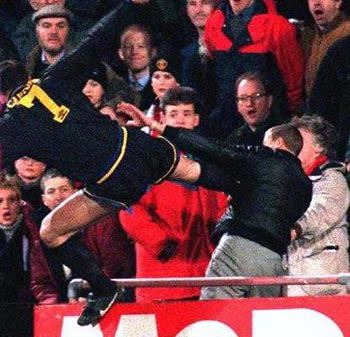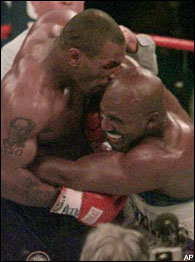Some cases, like Cantona's infamous 1995 kung-fu kick to a spectator, are obviously criminal, but Suarez's case is harder to judge. Where to draw the line between a crime and a rule infraction? Many acts performed on a football pitch, not to mention in the more violent contact sports like rugby and boxing, are surely crimes when performed against random citizens on the street, but that doesn't mean much. A surgeon can cut people open, but if I do it that's a crime (even if I mean to heal them), so context matters and we all know that.
An obvious discriminant is consent. Just as a patient consents to surgery, by participating in a contact sport players consent to a certain level of reasonable roughness. The underlying idea, which I take for granted, is that sensible adults can consent to virtually any activity, no matter how potentially damaging to their bodies (yes, there are exceptions at the borderlands of consent, like torture and death, but they're of no interest for sports so I'll leave them aside).
 On the consent idea, then, Suarez's act would be a crime because agreeing to participate to football does not entail giving consent to biting acts. That is, biting would constitute unreasonable roughness. If this is so, then his act would be a crime not because it was a personal vendetta or a reaction foul unrelated to play; after all, vendettas are relatively common on a football pitch. Instead, it's that it's an unacceptable kind of vendetta. Had he kicked him, pushed him, or elbowed him in the face, it may have been different.
On the consent idea, then, Suarez's act would be a crime because agreeing to participate to football does not entail giving consent to biting acts. That is, biting would constitute unreasonable roughness. If this is so, then his act would be a crime not because it was a personal vendetta or a reaction foul unrelated to play; after all, vendettas are relatively common on a football pitch. Instead, it's that it's an unacceptable kind of vendetta. Had he kicked him, pushed him, or elbowed him in the face, it may have been different.Even if all of the above is true, still the line is shallow. Why are kicking and pushing reasonable but biting isn't? Aren't they all inflictions of pain with the intent to harm damage? For that matter, biting is unlikely to cause any lasting damage, while kicking can break legs. So what's the rationale for establishing reasonable roughness?
Perhaps we could allow the offended party to set the standard of reasonable roughness. Just as some criminal cases depend on the victim having to press charges, likewise if Ivanovic thinks that Suarez's action is beyond reasonable roughness, then it was. This is obviously subjective, with all the pros and cons of that.
Another possibility is to appeal to popular will. Reasonable roughness is whatever most experts consider it to be. As is common with most social practices and milieus, the rules are not set in stone but evolve with time and perception. Since obviously it is impossible to "poll" the experts every time a player is ejected for violent conduct (or even to specify with sufficient generality who is and is not an expert), we will need some governing body to interpret the popular will and set standards that will seem sensible to most or all involved. The FA disciplinary board is one such body.
 A third option is to refer to whether the kind of act involved in the episode of violence is an act that is also part of regular game play. There's a sense in which kicking and pushing are natural parts of football. They are fouls that, when performed intentionally and with the intent to harm, are especially heinous and punished more severely--but still punished as fouls. By contrast, biting is not a normal part of the game and it is an act of violence. A similar normative standard can hold for each sport. In boxing, for instance, punches below the belt is an abuse of a normal boxing action, but biting and kicking aren't (you hear that Mike?).
A third option is to refer to whether the kind of act involved in the episode of violence is an act that is also part of regular game play. There's a sense in which kicking and pushing are natural parts of football. They are fouls that, when performed intentionally and with the intent to harm, are especially heinous and punished more severely--but still punished as fouls. By contrast, biting is not a normal part of the game and it is an act of violence. A similar normative standard can hold for each sport. In boxing, for instance, punches below the belt is an abuse of a normal boxing action, but biting and kicking aren't (you hear that Mike?).In the end, I guess that this is the same kind of debate that boards have whenever there's a case that pushes the established disciplinary guidelines. And of course it's up to individual judiciary/law enforcement agencies to intervene as they see fit. For his kick, Cantona was banned (by FIFA) from every football competition worldwide for 8 months, fined £20.000 (by Manchester United), and sentenced to 120 hours of community service (by a judge). By contrast, Suarez's infraction did not involve someone who hadn't agreed to some kind of reasonable roughness, and as such will probably be settled within the boundaries of the FA.
.
.


No comments:
Post a Comment